Starting an online store has never been easier than it is today. Compared to just five years ago, there are now platforms that let you set up an online business without requiring any coding skills. These platforms provide all the essential tools you need to manage and scale your online venture, from inventory and marketing to order fulfilment across multiple channels.
With a plethora of eCommerce platforms to choose from, it can be challenging to determine which one is the ideal fit for your business. To simplify this process, we’ve conducted extensive research and compiled a list of the best eCommerce platforms in India.
What Are eCommerce Platforms?
E-commerce platforms are websites or apps designed to facilitate online sales for businesses. They serve as virtual storefronts, offering a suite of tools that allow you to manage your inventory, process payments, fulfil orders, and engage with customers. These platforms can either function independently or be integrated into larger business management systems.
Whether you’re a small business owner looking to increase brand awareness or an employee at a large corporation aiming to streamline online sales, eCommerce platforms offer various options to suit your needs. Platforms like Shopify, Wix, and WooCommerce have become indispensable in today’s digital landscape.
How to Pick the Right eCommerce Platform for India?
If you’re considering launching an online store and are weighing your platform options, there are key features you should prioritise:
- Website Design and Customisation: A user-friendly and navigable online store is vital. Ensure that the eCommerce platform you choose offers comprehensive customisation options to make your store unique and easy to use.
- Product Management: As your online business grows, you’ll need to effectively manage product development, marketing, and sales. The platform should make it easy to add and manage products across multiple warehouses in India and be scalable for future growth.
- Payment Methods: To attract a global customer base, your store needs to support multiple payment options. Pay special attention to whether the platform is compatible with payment systems commonly used in India.
- Third-Party Integrations: Ensure that the platform seamlessly integrates with your existing tools and any additional tools you may require for accounting, marketing, sales, or overall automation.
- Shipping and Tracking: Opt for a platform that collaborates with reputable Indian shipping companies and allows customers to track their orders in real time.
- Multi-Channel Fulfilment: Consider platforms that enable you to sell your products on various online marketplaces, such as Flipkart and Amazon, alongside your own website.
- Analytics and Reporting: Data-driven insights are crucial for business expansion. The platform you choose should offer robust analytics and reporting features to help you make informed decisions.
By prioritising these features, you’ll streamline your operations and provide an exceptional customer experience.
An ecommerce web design company expertly navigates the digital landscape to recommend optimal platforms for its clients. Their insights ensure businesses align with platforms that amplify growth and enhance user experience.
Next, we’ll delve into an in-depth analysis of the top eCommerce platforms in India, evaluating how well they align with the aforementioned criteria to help you make an informed decision for your business venture.
9 Popular & Best eCommerce Platforms in India
Before diving in, it’s crucial to remember that the best eCommerce platform for you may not necessarily be the ideal choice for another seller. Therefore, you must consider your specific business needs and budget to select the appropriate platform.
Shopify

Shopify is a renowned and long-standing eCommerce platform used globally for buying and selling goods online. In India alone, Shopify has empowered over 33,000 individuals to become entrepreneurs and expand their online businesses both domestically and internationally.
Shopify offers a comprehensive suite of tools designed to help you establish and scale your online business. From product management to simplifying the buying process for customers, Shopify has you covered. Additionally, Shopify features its own app store, where you can find a variety of apps that easily integrate with your website. These apps extend functionalities in areas such as accounting, marketing, and automation.
If you’re not tech-savvy, Shopify provides pre-designed themes that allow you to set up your online store without the need for coding. For larger enterprises seeking more advanced features, Shopify Plus is available as an upgraded version of the platform.
Benefits
- Easy to use and SEO-optimised.
- Compatible with popular payment systems in India.
- Supports multilingual websites for diverse linguistic regions.
- Integration with various online marketplaces.
- Advanced automation tools simplify sales and marketing.
- A wide range of responsive themes tailored to different business types.
- Extensive third-party app selection to enhance your store’s functionality.
- Mobile tools allow you to manage your business anytime, anywhere.
Drawbacks
- Limited customisation options.
- Built-in reporting is not available for users on the basic plan.
- Heavy reliance on third-party apps for advanced functionalities.
Pricing
Shopify offers a 3-day free trial to explore its platform. Following that, a special offer allows you to use the platform for just ₹1994 per month for individuals and small businesses. Subsequent plans start at ₹7447 per month and can go up to ₹30164 per month. Special rate of ₹20 for the first three months is available for all packages.
WooCommerce
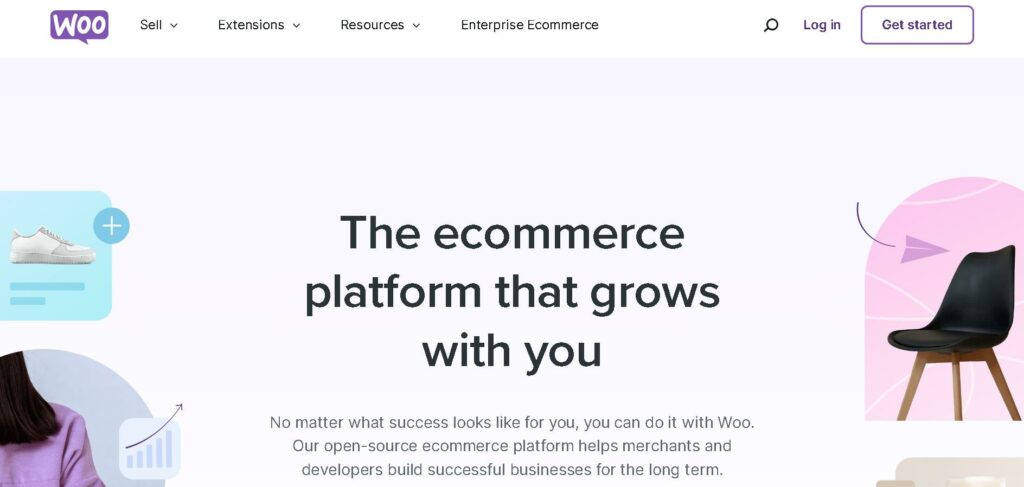
WooCommerce is a widely-used eCommerce platform that has empowered over 5 million businesses to launch their online stores. It claims a significant share of the market, with approximately 27% of the top 1 million websites utilising its services for their online shopping needs. As a free and versatile platform, WooCommerce is specially designed to integrate seamlessly with WordPress websites.
To get started, simply install the WooCommerce plugin on your WordPress site, and your online store will be up and running instantly. While the platform is straightforward for setting up a basic shop, you may need coding skills to implement advanced features and sophisticated designs.
Benefits
- Open-source nature allows unlimited customisation.
- Easy access to real-time shipping rates from leading shipping companies.
- Comprehensive set of marketing tools, spanning advertising, automation, CRM, email, social media, SEO, and sales.
- Scalable and compatible with various other services.
- Quick checkout options with special express payment features.
- Capability to sell on multiple platforms like Facebook, Pinterest, Etsy, eBay, Shopee, and more.
Drawbacks
- Costs can escalate quickly when adding multiple extensions.
- Being self-hosted, it requires you to manage upgrades and maintenance.
- Steep learning curve for beginners.
Pricing
WooCommerce itself is free to use. Additional costs will depend on the extra tools and extensions you choose to implement in your online store.
Also Read: 14 Ultimate eCommerce Frameworks: 2024 Edition
BigCommerce
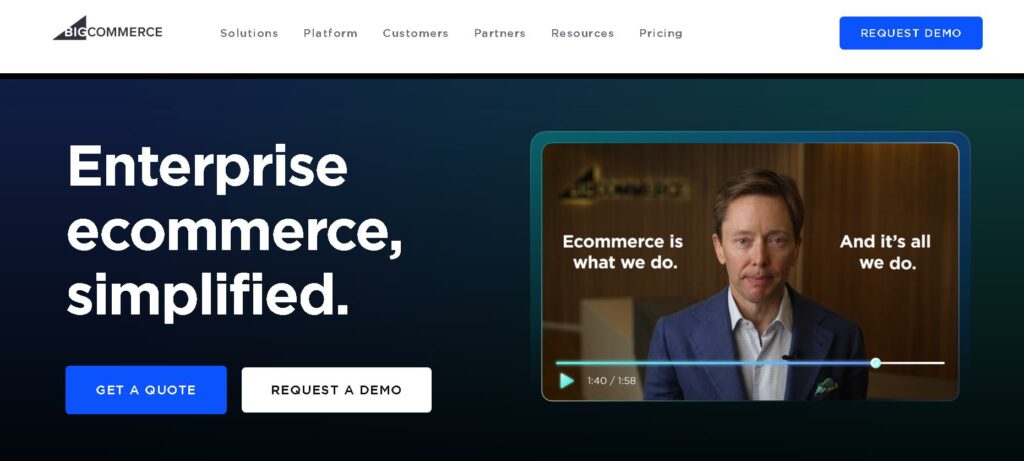
BigCommerce is an eCommerce platform tailored for growing businesses. It offers a user-friendly interface packed with all the necessary features for online selling. Built with scalability in mind, the platform comes equipped with advanced tools and can easily integrate with other systems. Thanks to its Stencil engine, BigCommerce simplifies both the design and management of your online store.
The platform enables you to create customer experiences that encourage repeat business. It streamlines store management by providing top-tier tools, high-quality hosting, and robust uptime to handle high traffic volumes.
Benefits
- Personalise your store effortlessly with a code-free page builder.
- Centralised inventory management across all your sales channels.
- Accept payments in over 100 currencies.
- Access to over 50 discount options.
- Smart marketing features for customer acquisition and retention.
- Streamlined, one-page checkout for a smooth customer experience.
- Enhance site performance with Google AMP.
- No transaction fees.
Drawbacks
- Some themes can be prohibitively expensive.
- Not well-suited for small businesses.
- Pricing is tied to revenue, which can make the platform costly as your business grows.
Pricing
BigCommerce offers a 15-day free trial to test its features. The pricing starts at $29.95 per month, with the most expensive option being the Enterprise plan.
Wix

Initially launched as a website builder, Wix has evolved into a robust eCommerce platform, gaining widespread popularity among retailers. It currently serves over 200 million users across 190 countries. Wix’s intuitive technology allows you to set up your website in just a matter of minutes.
While Wix is user-friendly and offers numerous customisation options, it is most suitable for businesses with a limited product range. There are also restrictions on storage capacity and app compatibility.
Benefits
- Choose from over 500 pre-designed templates.
- Includes a free SSL certificate for added security.
- Supports 150+ languages for broader reach.
- Advanced technology for automated processes to save time.
- Convenient refund processing through the control panel.
- Streamlined product listings and inventory management.
- Sell on popular online platforms like Facebook, eBay, Instagram, and Amazon Shops.
- Access to over 250 free and paid apps via the Wix App Store.
- Over 50 secure payment methods with automated sales tax calculation.
- Wix Ascend provides an array of useful tools, including email marketing, automation, Google My Business, Wix Chat, social media post creation, video making, and logo making.
Drawbacks
- Limited scalability for expanding product catalogues.
- Advanced customisation options are lacking.
- Performance under heavy traffic could be improved.
Pricing
Wix offers a 14-day free trial and a money-back guarantee if you’re not satisfied. Various pricing plans are available, starting at ₹225 per month and reaching up to ₹500 per month when billed annually.
Squarespace

If aesthetic appeal is a priority for your online store, Squarespace stands out as an excellent choice. Designed for users who lack coding skills but desire a visually appealing online storefront, Squarespace offers an intuitive content management system that simplifies the eCommerce experience.
It’s particularly well-suited for beginners and small businesses, serving as a viable alternative to platforms like Shopify. Whether you’re selling products, services, or subscriptions, Squarespace is robust and versatile, even offering features for booking appointments.
Benefits
- Intuitive drag-and-drop tools for effortless product organisation.
- The product image zoom feature allows for detailed, close-up views.
- Display labels indicating limited availability to create a sense of urgency.
- Suggest related products to encourage additional purchases.
- Enable express checkout for a streamlined buying process.
- Comprehensive analytics provide insights into product sales, abandoned carts, and purchase funnels.
Drawbacks
- Scalability can be a challenge as your business grows.
- Navigation could be further optimised for a better user experience.
- Limited options for multichannel selling.
Pricing
Squarespace offers a 14-day free trial to get you started. Pricing plans range from $33 per month for the basic package to $65 per month for the most advanced option. The Starter plan includes a 3% transaction fee, which is waived if you opt for higher-tier plans.
Ecwid
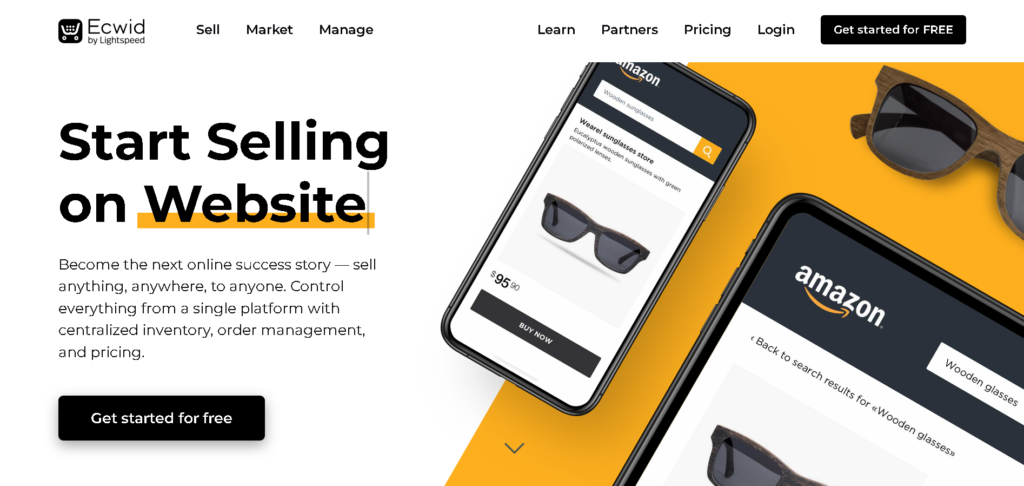
Ecwid is an ideal platform for those looking to quickly set up an online store. Serving over 1.5 million small businesses in India, this free online selling platform is compatible with many popular website builders and seamlessly integrates with them.
If you already have a website hosted on platforms like WordPress, Drupal, Weebly, Squarespace, or Wix, Ecwid allows you to transform it into a fully functional online store. Just add Ecwid’s store plugin or extension, and you’re set. Essentially, Ecwid offers two paths: either set up a basic online store with user-friendly customisation options or integrate it with your existing website or platforms like Amazon.
Benefits
- Easy to use, making it ideal for beginners.
- Features a responsive shopping cart.
- Offers advertising integrations with Facebook, Google, Pinterest, and Snapchat.
- Supports selling on multiple websites simultaneously.
- Access to an app market filled with additional features and add-ons.
- Mobile app available for Android and iPhone to help manage your business.
- Zero transaction fees.
- Allows selling on platforms like Amazon and Facebook Marketplace.
Drawbacks
- Limited customisation features.
- Customer support is unavailable for users on the free plan.
- Analytics and reporting features are not robust.
Pricing
Ecwid offers a free plan that allows you to sell up to 10 products. Paid plans start at ₹700 per month and let you sell up to 100 products. An Unlimited plan, priced at ₹5000 per month, removes all restrictions on the number of products you can sell.
Dukaan
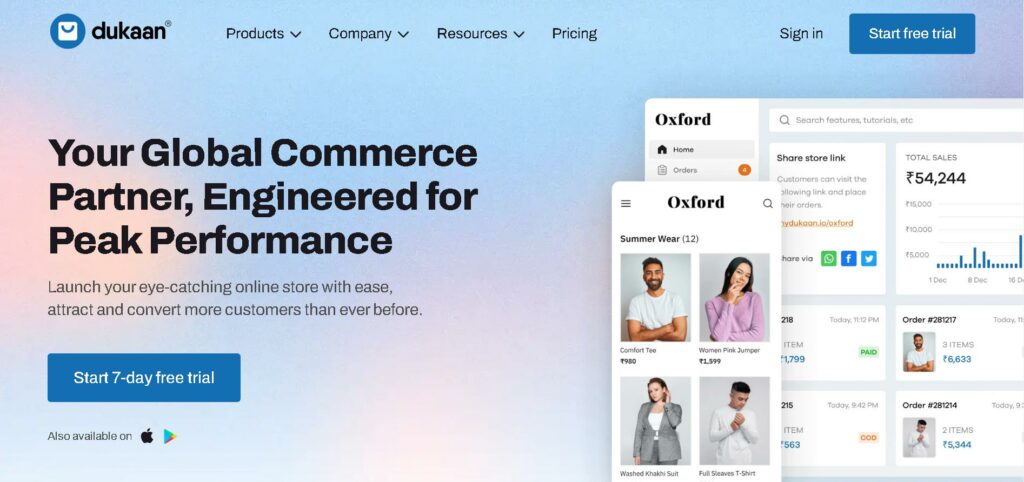
Launched in 2020, Dukaan is a burgeoning online shopping platform in India that’s already available in over 2,000 cities. With Dukaan, you can swiftly launch your online store—just name it, upload your products, and you’re ready to enter the competitive market. Designed for ease of use, this platform handles all aspects necessary for your online business, from product management and inventory to marketing, payments, and logistics.
Whether you’re selling clothes, accessories, furniture, electronics, books, stationery, or digital products, Dukaan accommodates a wide range of goods.
Benefits
- Professionally designed website templates that can be easily customised to suit your brand.
- Multiple strategies to promote and grow your business.
- Seamless integration of your custom website address with the Dukaan App.
- Hassle-free control over order statuses, enabling bulk approvals, shipments, and deliveries.
- Smooth online payments facilitated by Razorpay.
Drawbacks
- As a relatively new platform, Dukaan is still in its developmental phase and needs time to mature.
- Transaction fees are applicable across all plans.
Pricing
Dukaan offers a 7-day free trial, after which you can opt for one of three paid plans. Payment options are available quarterly or annually. Quarterly plans start at ₹667 per month, while annual plans begin at ₹500 per month. Transaction fees range from 0.99% to 2.99%, depending on your chosen plan.
Adobe Commerce
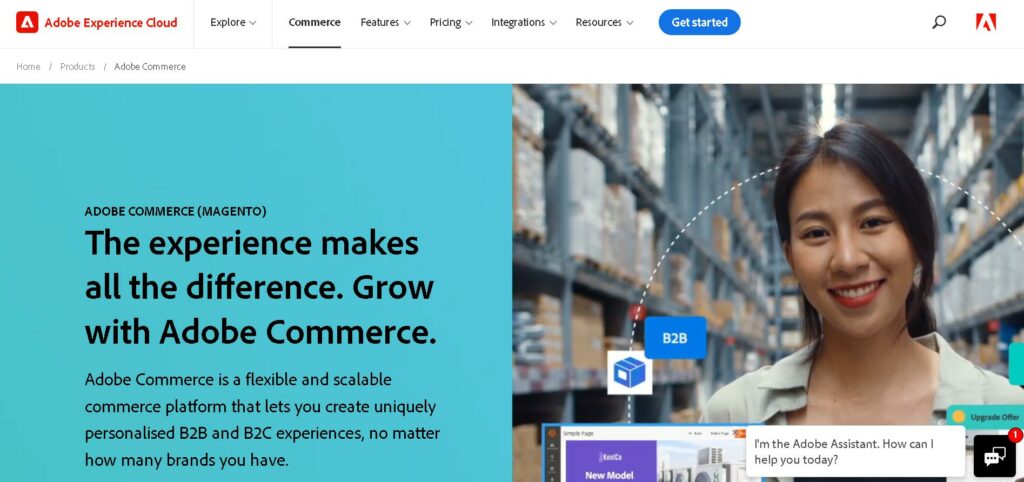
Adobe Commerce offers a platform that enables you to craft a unique and tailored shopping experience for your customers. This highly advanced e-commerce solution is well-suited for established businesses. It’s a fully customisable platform that requires ample storage space, a dedicated server, and a specific hosting level to provide you with complete control over your online store.
Benefits
- Seamless integration with other Adobe products enhances personalisation capabilities.
- Simplify repeat orders for customers with automatic subscription setups.
- Leverage artificial intelligence to automate catalogue updates and customer targeting.
- Employ real-time data analytics for effective inventory management.
- Smart technology powers a search function that offers helpful suggestions to users.
- Create an efficient multichannel delivery system to expedite the product delivery process.
Drawbacks
- More expensive compared to other platforms.
- Requires specialised knowledge for upgrades and maintenance, making it less suitable for beginners.
Pricing
For a tailored pricing plan based on your specific needs, it’s recommended to consult Adobe Commerce’s sales team for a quote.
OpenCart
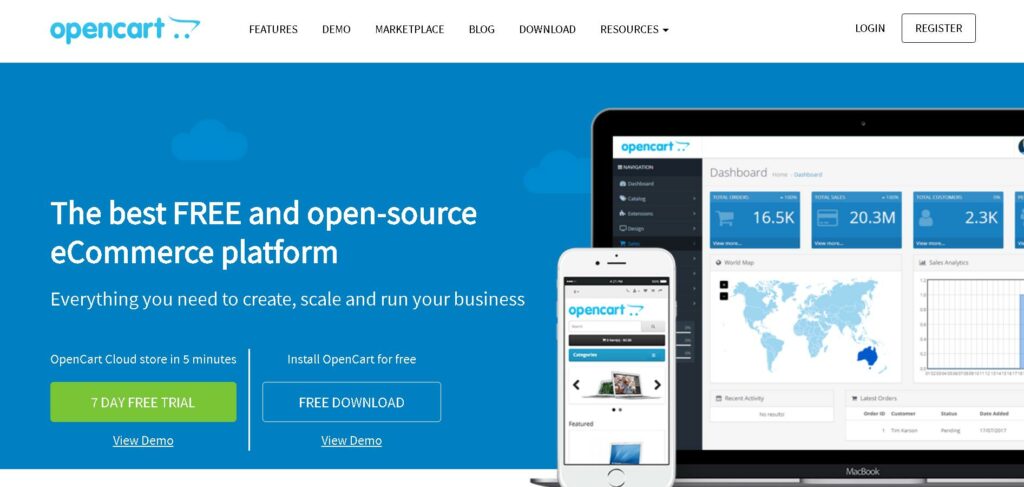
OpenCart is a free e-commerce platform utilised by over 400,000 websites worldwide. Built on a MySQL database, the platform offers diverse functionalities that can be extended for various needs. While it seamlessly integrates with popular payment gateways and shipping options, OpenCart also provides a comprehensive set of tools for customer resource management, marketing, and catalogue management. Although the platform is free to use, it also offers paid themes, plugins, and dedicated support.
Benefits
- A free and open-source platform allowing significant customisation.
- The OpenCart Marketplace offers a wide array of over 13,000 modules and themes to enhance your online store.
Drawbacks
- Limited free support is available, requiring users to opt for paid assistance for extensive help.
- Manual intervention is necessary for updating to newer versions of the platform.
- Users must rely on their own servers or third-party servers to host their online store.
Pricing
OpenCart itself is free to download and install. However, if you require ongoing support or additional features, you’ll need to budget for hosting services and any supplemental support.
Conclusion: Best eCommerce Platforms in India
The online market in India is projected to reach 99 billion US dollars by 2024 and surge to 200 billion US dollars by 2027. These figures indicate that retailers have a lucrative opportunity to establish and grow their online businesses in a competitive market.
For those new to the world of online selling, starting with a free eCommerce platform is a prudent approach. As you gain experience, upgrading to premium plans or transitioning to more advanced platforms can help you scale your business effectively.
Shopify is user-friendly and comes with a range of features designed to boost online sales, making it ideal for beginners.
WooCommerce is an excellent choice if you’re looking to integrate an online store with an existing WordPress website.
BigCommerce is particularly well-suited for medium to large-sized businesses, offering a variety of advanced functionalities.
Wix is an easy-to-use platform, ideal for stores with a limited range of products.
Squarespace caters to small businesses and independent store owners, offering visually appealing designs and templates.
Ecwid allows you to either transform an existing website into an online store using its plugin or build a new eCommerce store from scratch.
Dukaan provides a straightforward and cost-effective online selling solution, targeting small businesses.
Adobe Commerce is an advanced eCommerce platform designed for large enterprises with complex online selling needs.
OpenCart is a free, open-source platform that offers extensive customisation options, powered by a MySQL database.
FAQs
What are the most popular eCommerce platforms in India?
Popular choices include Shopify, Wix, WooCommerce, and BigCommerce. Dukaan also stands out as a local option designed specifically for the Indian market.
How do payment systems work on Indian eCommerce websites?
Many eCommerce platforms collaborate with popular payment gateways like PayU, Razorpay, and CCAvenue, offering various payment methods such as credit/debit cards, mobile wallets, UPI, or cash on delivery.
What legal regulations must be followed in India to run an eCommerce business?
Businesses are required to adhere to laws like the Consumer Protection Act of 2019 and the Information Technology (Intermediaries Guidelines) Rules of 2011. Additionally, businesses should be officially registered, obtain a GST number, and comply with all local and national tax laws.
What challenges might one encounter when running an eCommerce platform in India?
While the Indian market offers substantial potential, challenges include logistics, varying consumer preferences, and stiff competition. Also, navigating intricate tax laws and ensuring data security remain concerns, given the increasing risks of cyber attacks.
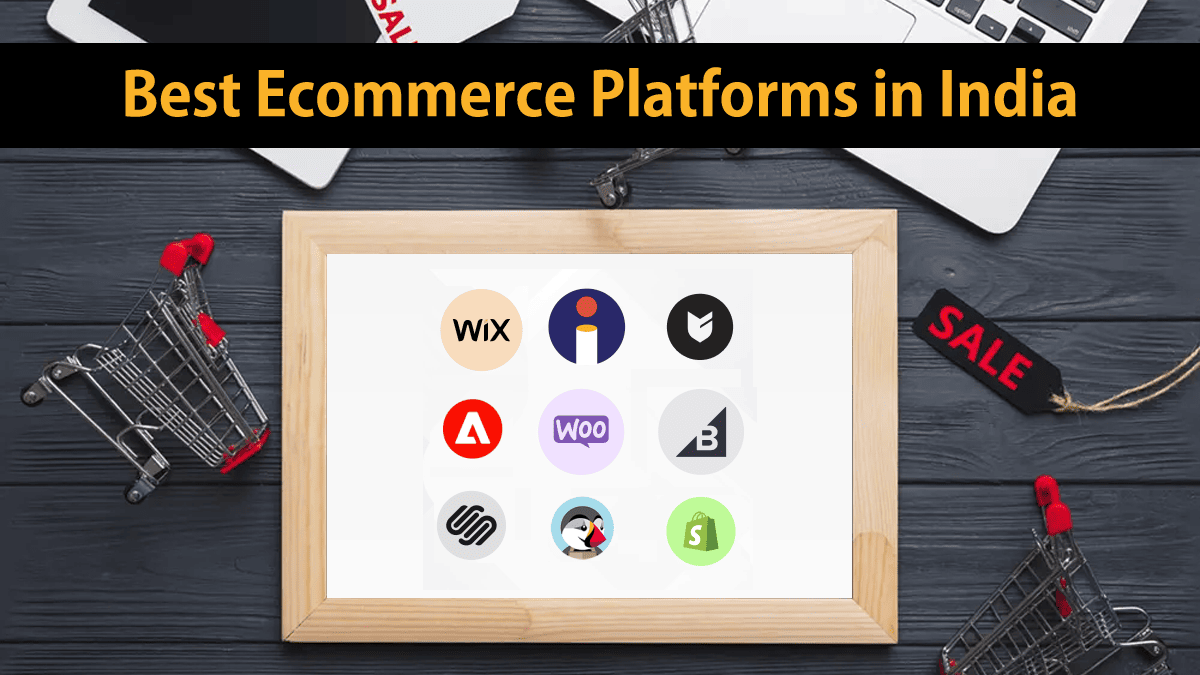






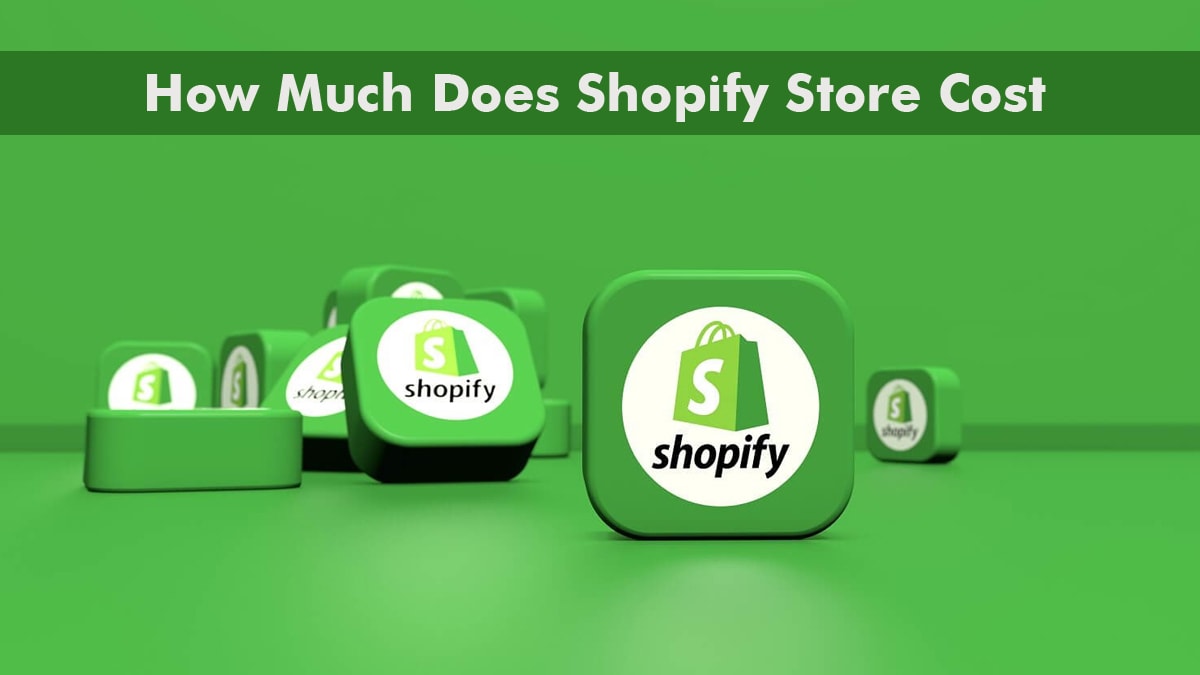
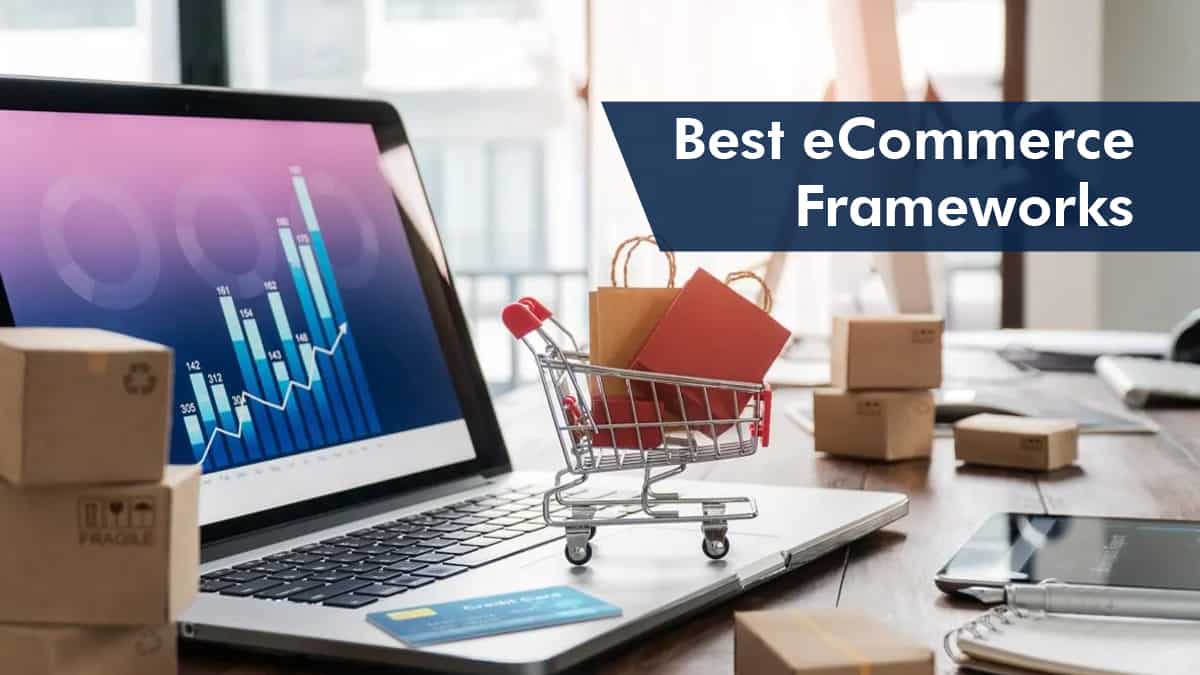

















 RSS Feeds
RSS Feeds